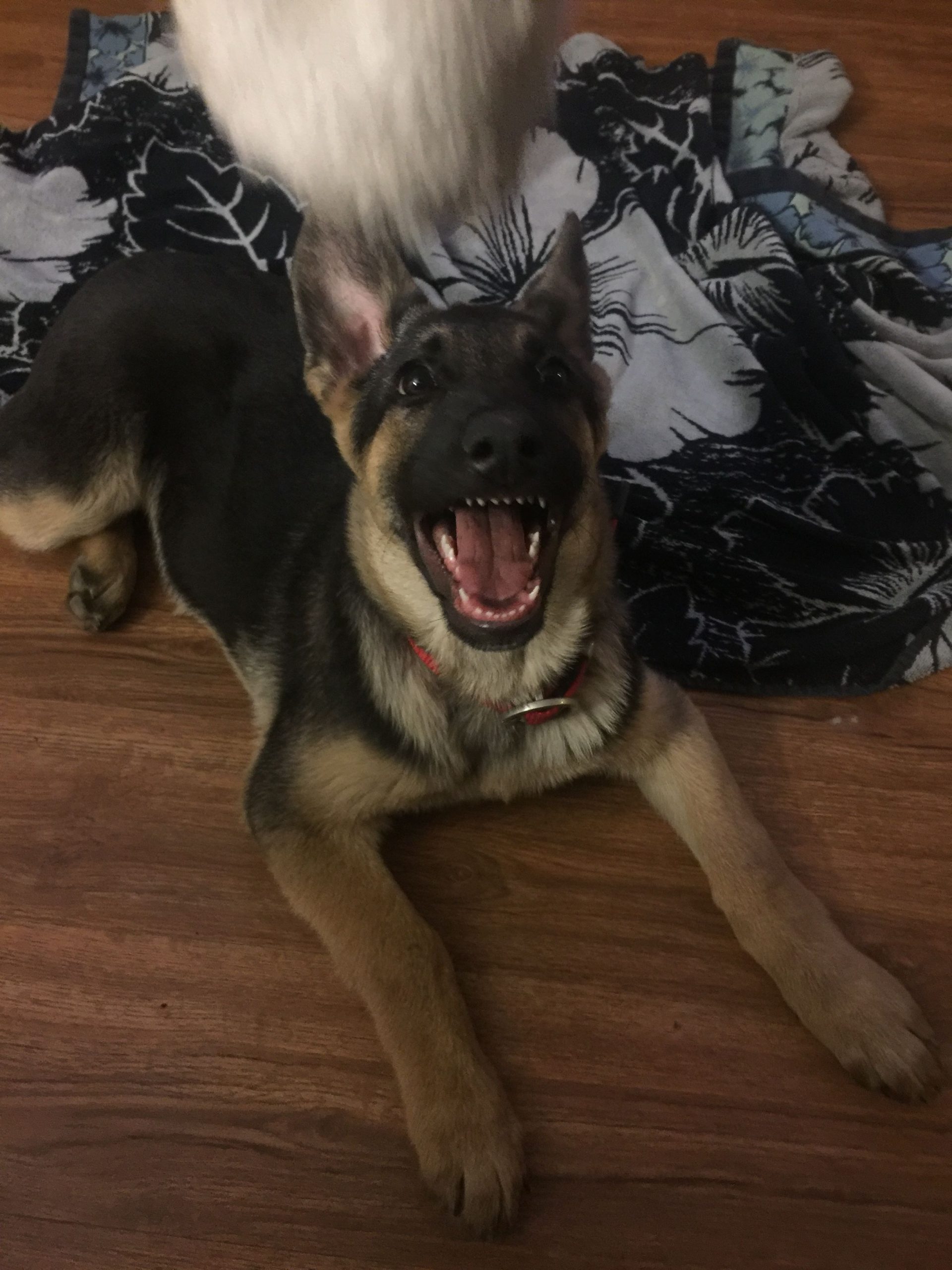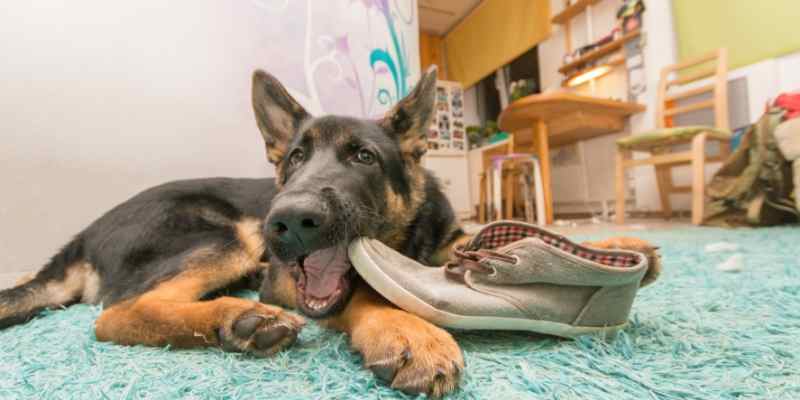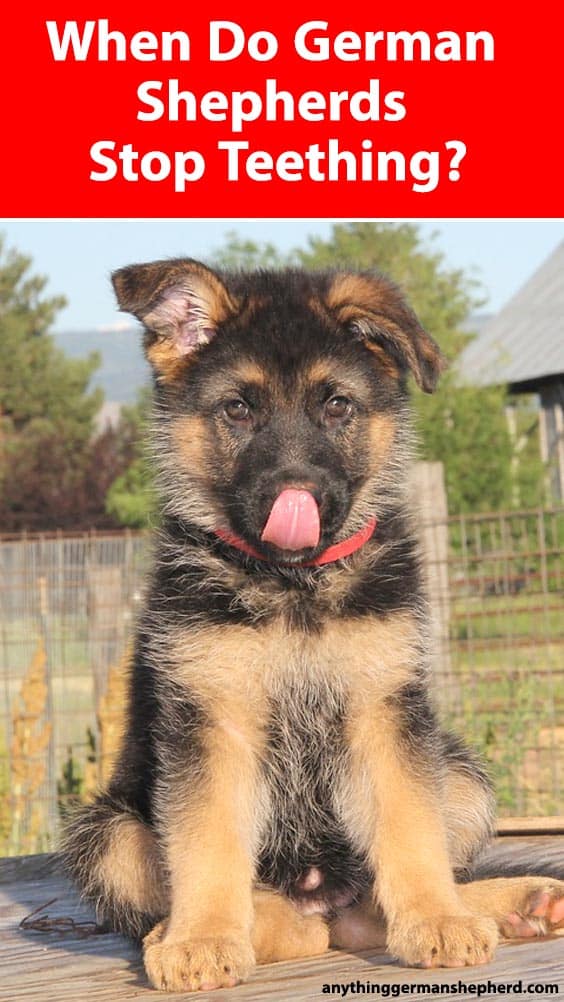Recommended German Shepherd Teething Toys
All puppies need something to chew on when new teeth are coming through. They will try to chew your shoes, furniture pretty much anything. To help them out, give them toys to chew on, but not the soft stuffed ones those simply wont cut it.
To help your German Shepherd puppy when teething, instead invest in some teething toys that are hard and durable enough to give their gums relief.
There are two teething toys we used with our own puppy which always worked a treat.
Firstly, theres the . Not only is a great for German Shepherds to get their teeth around, but you can also put treats inside of it to mentally challenge them as well.
What we also used to do was place ours in the freezer before letting our teething puppy have. That way it was really nice and cold and helped to soothe his sore gums.
My second recommendation is the . Its a fantastic alternative to chews like rawhide, and our dog still has this chew toy 3 years down the line. Its extremely durable and hard-wearing.
This is how much they will end up chewing it!
Best Chew Toys For Teething Puppies
As I mentioned, your new puppys chewing behavior will ramp up during the teething phase.
Before your new puppy turns into a whirlwind of destruction, find your furry pal an outlet for chewing by checking out these awesome chew toys for teething puppies.
Bonus Tip: Freeze puppy teething toys to give your pup a cooling, soothing way to play and chew.
German Shepherd Teething Process What Are The Teething Stages
Lets start by saying that German Shepherd adults have a variety of teeth mainly fangs, incisions, molars and premolars, and a large carnassial tooth.
Puppies usually grow all of their puppy teeth by the age of6-8 weeks, and they begin the tooth process at this time, which inevitablyloses their puppy teeth and gets a full set of adult teeth.
Puppy dogs and incisions are usually in full force at the age of 6 to 8 weeks, and permanent adult dogs and incisions are up to 3 months old.
Permanent molars, premolars, and large carnassial teeth are usually 4-6 months old they can grow because puppies do not have molars.
Also Check: Skinny German Shepherd Breed
Offer Teething Chew Toys
Not only is chewing an essential part of teething, its also a natural instinct that keeps dogs occupied and helps them manage a variety of emotions. Offering your furry friend appropriate puppy chew toys will give them teething relief and provide a safe, healthy chewing outlet. Many chew toys for teething puppies are made of softer materials for delicate baby teeth. However, puppies who are more powerful chewers or already have their adult teeth may need chew toys that are more durable. For added relief, freezer puppy chew toys can help ease gum pain and provide a comforting chewing experience.
Make sure all chew toys are appropriate for your puppys size and weight, and always supervise your dog while they chew. Dogs maintain their chewing habits into adulthood, so your furry friend can graduate to a tougher chew toy once they get their permanent teeth.
Use our Custom Product Finder Tool to select the best chew toy for your teething puppy!
The Nylabone Just For Puppies Key Ring Chew Toy

The Nylabone Key Ring Chew Toy is ideal for teething puppies its designed with a softer material that really massages and soothes sore gum.
The raised bristles and textures on this particular chew toy are my favorite feature. They help clean teeth and prevent tartar buildup as well.
This toys soft, chewy texture will give your pup hours of gentle chewing entertainment. And did I mention this toy is bacon flavored? Yum!
Allie loved this toy as a teething puppy, and a great bonus was that she was never able to destroy them.
You May Like: Trim German Shepherd Nails
Avoid Anything Thats Too Hard
When youre giving your puppy things to chew on you should avoid anything thats too hard. If they chew on something which is too hard, then they may end up splitting their baby teeth.
If this happens, its not uncommon for the teeth to get stuck in place, with the adult tooth being forced to grow around it.
As well as this theres also going to be an increased risk of an abscess forming in their mouth as well.
This means that you should definitely avoid bones, and be careful when letting them eat ice cubes as well.
How To Help A Teething German Shepherd
During the teething stage, your German Shepherd is going to suffer from a bit of pain and discomfort. That is why he will likely begin chewing on everything in sight and bite everyone and anything he can get his hands on. This is just a normal reaction to the pain he is experiencing in his gums.
So how can you, as the owner, help out?
Recommended Reading: A Chihuahua Mixed With A German Shepherd
Exercise And Teething German Shepherd Puppy
Its a common assumption that German shepherd pups shouldnt exercise when they are teething. That is not correct.
For a puppy, a regular exercise session will help a lot. Exercise like playing fetch and swimming will help destruct a puppy from destructive behaviour that she may develop.
Also, with the nervousness that the whole teething process comes along with, the exercise sessions and participating in engaging activities will help to calm her.
For a puppy, short sessions not exceeding 15 minutes daily will prove to be adequate.
Divide the 15 minutes session into two daily sessions, one session in the morning and another in the evening.
What Helps A Teething Puppy
Top 5 tips for teething puppies
Don’t Miss: Who Would Win Rottweiler Or Pitbull
Note: Dont Give Your German Shepherd Puppy Your Old Shoe
Most puppies love nipping off shoes as a way of soothing themselves. Consequently, I have seen people propagate such behaviour by presenting old shoes to the puppies.
Although the result will be achieved, there comes a risk. Whereby, next time when you are not around, your puppy may start nipping off any shoe around.
The puppy will not distinguish between a $10 shoe and a $150 shoes. All are equal, and the price wont deter your puppy from biting any of them.
German Shepherd Puppy Proofing Your Home
Your teething German Shepherd puppy wants to chew everything within his reach to distract himself from the symptoms of teething. Here are some tips to protect your puppy and your stuff in your home:
- Keep your cleaning supplies and medicines in a secure storage area. Because wires pose a risk, cover exposed cables within your GSD puppys reach. All human foods especially chocolates and grapes should be out of your GSD puppys reach because these can be toxic to your teething puppy.
- Use taste deterrents spray on the legs of off-limits furniture such as tables, chairs, desks, and beds. These substances can be bitter or spicy hot. Dogs normally dislike these tastes.
- Closely supervise your pup when he is loose in the house. You may also designate a chewing area in your home.
- If you cant watch your puppy, use a secure crate or pen area so he wont chew everything.
Although teething is challenging for you and your puppy, its a normal process because its a sign that your German Shepherd puppy is growing. Remember that teething is just a phase and it will pass. Apply the tips above so both of you can keep your sanity intact.
Don’t Miss: Chihuahua German Shepherd Puppies
Take Them To The Vet Regularly
Dogs tend to hide their symptoms when they dont feel good. At the same time, most health conditions are easier to treat the sooner theyre caught. Thats why you should take your German Shepherd to the vet at least once a year when theyre younger and twice a year after they turn 7.
It may seem silly to take a healthy dog to the vet, but your German Shepherd may not be as healthy as you think. That seemingly pointless vet visit could save your dogs life.
Bleeding Red Or Swollen Gums

During teething, its normal for your puppy to have red, bleeding, or swollen gums. This is due to teeth erupting through the gums, resulting in irritation.
If your puppy has just lost one of their deciduous teeth, you might notice some blood, so try not to be alarmed. Bleeding may also occur while your puppy is eating or chewing.
That said, if you see a large amount of blood, check over your puppys mouth to make sure they havent hurt themselves. If youre concerned, dont hesitate to get your dog seen by a vet.
Recommended Reading: German Shepherd Puppy Feeding Amount
Get Your Puppy Used To Having Its Mouth Handled
Generally, during play, you will spend a lot of time petting your dog anyway, but you should also train it to get used to your hands around its face and muzzle.
Start teeth brushing training by handling your pets muzzle.
Touch its face and mouth area gently and repeatedly throughout the day. Giving it treats will help simplify this process.
Once your dog is used to your hands around its face, you can begin lifting its lips to expose the puppy teeth and gums.
Bone And Joint Problems
A number of different musculoskeletal problems have been reported in German Shepherd Dogs. While it may seem overwhelming, each condition can be diagnosed and treated to prevent undue pain and suffering. With diligent observation at home and knowledge about the diseases that may affect your friends bones, joints, or muscles you will be able to take great care of him throughout his life.
Intervertebral disc disease. Note how the cushion of the disc materal has extruded and puts pressure on the spinal nerves.
Intervertebral disc disease is a common condition in Shepherds. The disease is caused when the jelly-like cushion between one or more vertebrae slips or ruptures, causing the disc to press on the spinal cord. If your dog is suddenly unable or unwilling to jump up, go up stairs, is reluctant to move around, has a hunched back, cries out, or refuses to eat or go potty, he is likely in severe pain. He may even drag his back feet or be suddenly paralyzed and unable to get up or use his back legs. If you see symptoms, dont wait. Call us or an emergency clinic immediately! For less severe cases, rest and medication may resolve the problem. In many cases involving paralysis, well recommend surgical removal of the ruptured discs . As with so many other diseases, weight control helps to prevent this problem. You should also use ramps or steps from puppyhood on so that your dog doesnt spend a lifetime stressing his back by jumping on and off of the furniture.
Don’t Miss: Royal Canin German Shepherd Puppy Feeding Guide
How To Stop Your German Shepherd Puppy Chewing When Teething
Keep in mind that your German Shepherd puppy will want to chew anything and everything he sees because its a way to cope with his teething pain. When the baby teeth fall out and the larger adult teeth push through, it can be very painful to your pups.
Therefore, chewing is a coping mechanism for your puppy as it provides him with the pain relief he needs during this excruciating and uncomfortable time.
Its best to monitor your pups closely or prevent them from entering any rooms with the furniture you dont want to get ruined. In some cases, you may have to hide items in the house so it doesnt get destroyed by your pups chewing.
Its normal for a German Shepherd puppy to chew anything he can get his teeth on because its his natural instinct during this time. Here are some things owners can do to make them feel more comfortable.
Chew proof your house
When my dogs were puppies and were going through the teething stage, I had to make sure doors to certain rooms with expensive furniture were closed when I wasnt home. When I was home, I had to put up foldable dog gates to prevent my pups from entering certain rooms.
I also place the stuffed animals in places where my puppies couldnt reach them. My mom also covered the edge of the bed and sofa with thick blankets.
A teething German Shepherd puppy isnt afraid to chew through anything so beware!
Provide them with cold treats
Exercise to expend their energy
Entertain your German Shepherd puppies
Provide them with chew toys
Do Teach Them That Biting Means Game Over
If your puppy continues to bite, ignore your puppy by turning your back away from her and tucking your hands in your armpits.
She needs to understand that biting ends playtime and that it does not give her anything in return. Over time, your consistent reinforcement of this will be highly effective to curb your puppys biting behavior.
Read Also: German Shepherd Pants A Lot
When Do German Shepherds Start Teething
German Shepherds typically have their baby teeth for 6 to 8 weeks before they start teething. The teething period usually lasts 4 to 5 months. Their canines and incisors will arrive before they are 3 months old. Premolars, molars, and the carnassial tooth will come in before they are six months old.
When are German Shepherd puppies born without teeth? German Shepherd puppies are born without teeth. They begin getting teeth around 6 to 8 weeks of age. The incisors come first. Next is the canine teeth and the last is the premolars.
How do German Shepherd puppies get their teeth? Familiarize yourself with the stages so that you can know how to deal with teething. German Shepherd puppies are born without teeth. They begin getting teeth around 6 to 8 weeks of age. The incisors come first. Next is the canine teeth and the last is the premolars. The last premolar comes out between 8 to 12 weeks old.
When do German Shepherd puppies start crawling? The puppies should also be crawling quite well by this time. This is the beginning of the transitional period of GSD development which typically lasts about a week or so. This is also a period of profound changes in the German Shepherd puppies growth and development.
Verdict: This Too Will Pass
Its not easy for your teething German shepherd pup during this phase neither is for you. Theres too much he is learning at this time, for example, what to chew and what not to.
It can be discouraging to find that he has chewed your most valuable asset.
Bear with him as you try to chew-proof your home. Remember, this, too, will pass away.
Let me hear from you how is your teething German shepherd responding to the teething problem? Have you tried any of the recommended products to suppress the teething problem?
Please share your experience with us in the comment section.
Read Also: Can A Rottweiler Beat A Pitbull
Preventing Chewing In Your Home
So, while we know that chew toys will help to prevent your pup from chewing your home to bits, there are other ways to prevent chewing in your home. You can do plenty of things that will chew-proof your home, and also sooth your pups sore mouth as well.
Once your puppys milk teeth start falling out, they will want to get their teeth around just about anything that they can in order to get some relief. This may mean you start hiding your valuables, limit their access to certain rooms of the house, and keep one eye on them at all times.
It is a natural instinct among dogs to want to chew things to bits during their teething phase So, as their owners and families, it is down to us to give them a helping hand in dealing with this. Here are a few things that you can do to make your home safe and help out your pained pup.
How Long Do German Shepherds Teethe For: Up To 20 To 24 Weeks

For the most part, many German Shepherd puppies will have stopped teething by the time they reach 6 months or 24 weeks old. However, some can take longer so dont freak out or be surprised. Every dog is different and the dental development stages vary for each dog.
While the puppy milk teeth push through easily, the same can not be said of the adult teeth. It takes time for the German Shepherd adult teeth to push through and grow.
This is especially true of the molars at the back of the dogs mouth. It will take the molars to grow in.
Even if it takes your German Shepherd puppy a little longer to stop teething, by the 8th month, he or she shouldve stopped teeth.
Again, there are cases when the teething doesnt stop until after the 8th month. This is pretty abnormal, but can still happen. If youre ever concerned or worried, we highly recommend that you consult with your vet.
Once the teething stops, youre probably wondering, how many teeth do German Shepherds have. At this point, your German Shepherd dogs should have a total of 42 shiny, white, and strong adult teeth.
Recommended Reading: Worst Dog Food For German Shepherd